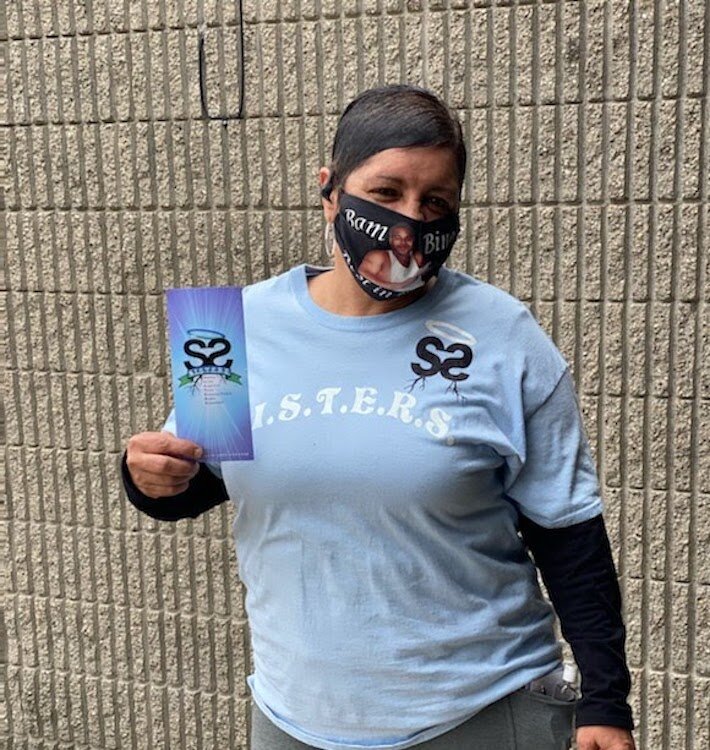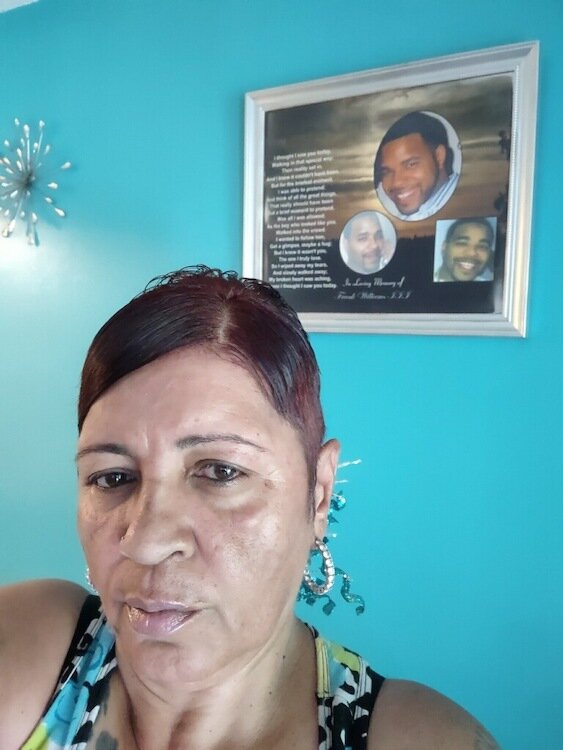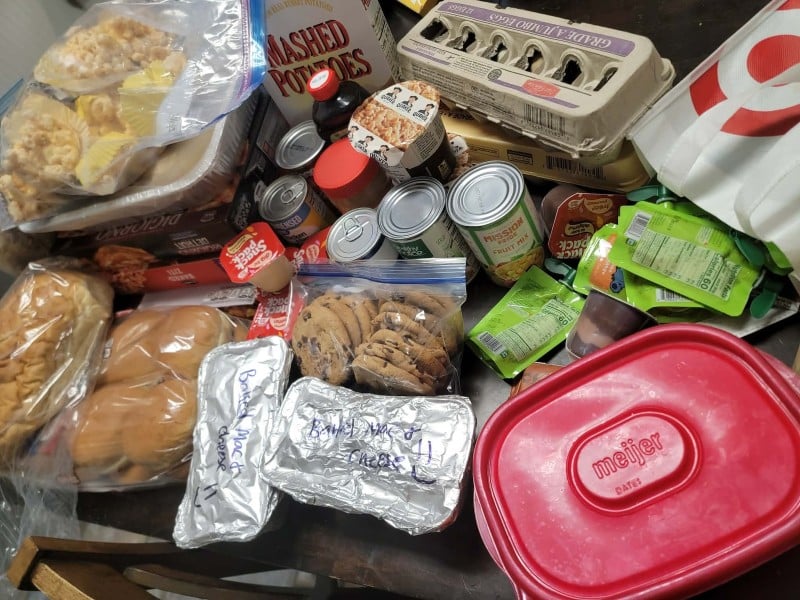Battle Creek moms turn pain into purpose with support group for those who lose children to violence
S.I.S.T.E.R.S. (Sharing In the Support of Those Enforcing Victims’ Rights Shamelessly) Turning Pain Into Purpose – is made up of mothers whose sons and daughters were the victims of violent crimes in Battle Creek that have yet to be solved. They are there for one another.
The criteria for membership in a group that Rosetta Brewer co-founded in March 2019 is steeped in pain and loss.
The group – S.I.S.T.E.R.S. (Sharing In the Support of Those Enforcing Victims’ Rights Shamelessly) Turning Pain Into Purpose – is made up of mothers whose sons and daughters were the victims of violent crimes in Battle Creek that have yet to be solved. For them there is no closure.
Brewer says she will never forget the January night in 2006 when she was told that her son, Frank Williams III, was shot outside a known crack house. He would have turned 41 on Aug. 27. The pain and grief of losing the oldest of her two sons was amplified by the unwillingness of witnesses to come forward and identify the shooter who was known to Brewer and her family.
“My son got into it with a guy on the phone who said, ‘I will kill your mom and your kids.’ My son went to the crack house. There was an ongoing beef with our family and these kids who had just come back from robbing a place,” Brewer says. “There was a shootout and my son suffered a single gunshot wound to the back that blew out his lung. Another young man put him in the car to get him to the hospital, but for whatever reason, they never made it to the hospital and he died in the car.”
Brewer says the young man who was driving refused to be a witness because he said it would be “snitching,” which goes against the street code followed by young men like him who are part of what they refer to as gangs.
She dismisses the term gangs. These are kids who hang out together and engage in criminal activity, she says. “They aren’t really gang members. The real true gangs are in big cities like Los Angeles and Chicago,” she says.
“These kids, they called me ‘auntie’ and they have slept over and played at my house,” Brewer says.
That her deceased son became involved with the local groups fighting against each other, is a story she does not sugar-coat. “After he served his time in prison, he came back and started getting into trouble again,” she says.
In the back of her mind, she says she knew there was the potential for it not ending well, but she never thought that could mean losing him forever.
Turning her personal pain into a mission
For the first two years after her son’s death, Brewer says she pretty much forgot that she had another son who was dealing with the loss of a brother and navigating his own grief. A large framed photograph of Frank in his casket hung on the living room wall as a constant reminder that only reinforced the distance she had put between herself and her remaining child.
Eventually, she moved it into her bedroom because she says, “I forgot my other child.”
That photo is now in a closet in her home.
For a time, that photo served as a “reality check” and was brought along with her when she spoke at gatherings with community youth about what could happen to them if they followed her son’s path.
“This is a passion of mine. First, I was working with the kids, but the kids were not hearing me and I knew I needed to be more support to the moms,” Brewer says. “In my group, it’s not just Black moms. I have moms of all races.”
These earlier speaking engagements occurred under the auspices of Parents Against Gang Violence, which became Families of Peace. When these groups “fell apart,” Brewer says she began to put together another organization because parents like her need ongoing support from parents who know what the loss of a child feels like.
She took the relationships she had already developed with other parents, in addition to members of the Battle Creek Police Department, specifically Det. Sgt. Jeff Case, and the city’s legal community, and co-founded S.I.S.T.E.R.S. with Antwoine Davis, whose son, Khari, was shot and killed in 2018. The man charged with shooting him was found not guilty.
Antwoine Davis passed away in November 2020, and Tracey Cummings stepped in a short time later. Cummings’ son, Joseph Edward “Lil Joe” Bowser II, had been shot to death in March 2018. His death remains unsolved.
Brewer says there were 65 unsolved homicides within the city of Battle Creek between 1968 and 2016 according to a list provided to her by the Battle Creek Police Department.
Police Chief Jim Blocker says the BCPD’s relationship with Brewer and her organization is positive and necessary.
“If this helps work through community trauma, but at the same time yields potential justice why wouldn’t we want to be active participants?” Blocker says. “Rosetta is a great example of someone who didn’t let trauma keep her down too long. She leans into her grief and makes a positive contribution.”
Brewer says, “It’s easier for a mother who has lost a child to relate to someone who has gone through that. Everybody’s life goes on and we’re stuck in this reality. Time may go on, but you never forget about your child and why they are gone.”
When Brewer hears about the violent death of a young person in the community, she puts together a care package and visits the mother or father or both.
“When I hug them, our hearts connect and I can feel their pain and they can feel mine,” she says.“You have to stay strong for these moms. I had one mom recently who lost her child in a car accident. I went to see her that night and she just fell into my arms and cried.”
Aleena Robinson, Victim Advocate with the BCPD, says S.I.S.T.E.R.S. is a unique group because of its membership and the support it provides. Robinson says she makes referrals to Brewer “all of the time.”
“If there’s a homicide, my immediate thought is of a mother grieving the loss of a child and it’s Rosetta’s group that comes to mind,” Robinson says. “What she tries to do with the community is establish rapport. She checks in with the mom and is someone who has been through it. She can feel a mother’s pain and she has a really unique perspective that not everyone can give.”
Once the initial crisis phase has passed and the victim or the victim’s family is in a position to accept the community’s help, Robinson reaches out to family members or the victims and tailors her approach based on their needs.
She says she’s never had a mom say that she didn’t want to speak to another mother who has experienced what she’s going through. “I think that her (Brewer’s) work has a ripple effect regardless of whether she’s working with a victim or someone in the community,” Robinson says. “Her work reaches far beyond the scope of an initial referral.”
Brewer says, “I was doing this before Aleena came on board. I pretty much know everybody in Battle Creek, so when it happens, I know. I give it a few days and try to get in touch with them by phone to see them. I’ve always been a person who needs to take care of somebody. I know their pain and I know what they’re going through. Each day you learn to deal with it. You don’t have a choice.”
Brewer says she tries to stay in touch with victims’ families. Prior to COVID, S.I.S.T.E.R.S. had been meeting on a regular basis. She says she hopes to re-start in-person meetings as soon as it’s safe to do so.
Remembrance and Justice
In the midst of providing ongoing support, Brewer is turning her attention to a permanent memorial she is working to have put in place. The memorial will include the names of victims of unsolved murders. She does not yet know what the memorial will look like or where it will be placed and is just beginning the process of raising money to cover the cost.
But as fitting as this tribute may be, she knows it doesn’t take away the daily feelings of pain, loss, and occasional anger that comes with knowing those who took the lives of sons and daughters are alive and have yet to be arrested.
Chief Blocker says there are a number of reasons for these unsolved cases, including witnesses who refuse to come forward out of fear for their own personal safety or concern over the drain their participation in a lengthy legal process could have on already-limited resources. He says overall his department still receives a high level of participation from those who witnessed a crime and when they don’t there’s a specific reason for it.
“We may have a strong inclination on who the suspect may be, but unless we can validate that, the prosecutor won’t take it to court,” he says. Then there’s the risk of a trial and an acquittal. “Folks get acquitted and we can’t try them again.”
Brewer says she wants the families of unsolved murder victims to come forward to be the voices of the victims. “We need to try to get that list knocked down and get some justice for people. If we don’t speak up, no one will,” she says.
The man Brewer knows to be her son’s murderer is serving time in prison for another shooting. This is of little comfort to her though she acknowledges getting the justice she seeks won’t bring her son back or offer the closure she needs.
“I still don’t have my child. Nothing’s going to close this. This person who shot my son is still alive,” Brewer says. “I have to go to a cemetery and look at a picture of my son on a tombstone. When you lose a child there’s no word. A person who loses a spouse is widowed and a child who loses a parent is an orphan. There is no word for people like me.”
















